The Lobster, the feature film masterpiece from director Yorgos Lanthimos, leads you through a profound and visceral exploration of love — light and dark, providing a perfect counter-point to the idealization of romantic partnership in marriage, as embodied by the Bachelor Nation hysteria and the internet dating craze. The story takes place in a rule-bound universe parallel to our own, where adult citizens are given forty-five days to find true love and to consummate their unions in marriage, lest they face the harsh fate of being turned into the animal of their choice, to be released into the wild to fend for themselves.
When we meet David, played by Colin Farrell, he has just been dumped by his wife, and sent to the Hotel (a quasi-prison), to search for a new mate. In his state of vulnerability verging on alienation, David finds temporary solace in the companionship of two bachelors, Limping Man (Ben Whishaw) and Lisping Man (John C. Reilly). Single guests of the hotel form couples based almost exclusively upon their primary defect, their Achilles’ heel, as it were. As David wades through available bachelorettes — a cast of characters that includes among others, Nosebleed Woman (Jessica Barden), Nosebleed Woman’s Best Friend (Emma O’Shea), Biscuit Woman (Ashley Jensen), and Heartless Woman (Angeliki Papoulia) — he is subjected to teasing lap-dances courtesy of the The Maid (Ariane Labed) at the hotel. Questioned by the icy and clinical Hotel Manager (Olivia Colman) about his wishes should he fail in his attempts to find a suitable partner, David tells her that he would choose to become a lobster. It should be mentioned that this is a film that relies on performances to great effect rather than any special effects or animation — so things never unfold as you might fear — or even as you might expect. The story twists and turns along ingenious and quite unexpected pathways.
The clever writing from director Lanthimos and his writing partner Efthymis Filippou is matched by exquisite, understated performances throughout. Colin Farrell has transformed himself to play the pudgy, middle-aged everyman David, whose acute dread is palpable and unsettlingly funny. As Short Sighted Woman, Rachel Weisz delivers a de-poeticized ingénue to stirring effect, with deadpan delivery per the “anti-Terrence Malick” direction from Lanthimos. Léa Seydoux plays the commanding and charismatic leader of The Loners, renegades who reject romantic partnership entirely, taking vows of chastity and refuge in the woods. Defiance of their rules – no flirting, kissing or touching – begets its own set of equally brutal and merciless repercussions.
With its absurdist premise, The Lobster is a marvelously disturbing, moving, esoteric yet accessible, intoxicating allegory about the human condition. John C. Reilly draws an analogy to the work of Stanley Kubrick – “in which the action is played naturalistically and realistically, but the circumstances of the world are really strange.” The film captures all the judgment, expectations, and disconcerting truths associated with “being married” or “being single,” by choice or by circumstance, and the gulf that divides those two worlds with not so much as a bridge across rigid ideological and cultural divides.
“I think it is a really original film about how do you lead an authentic life,” actress Weisz observes. “It is a romantic comedy,” in the sense of “love against all odds,” she defends. “I think it is a film — more than any film that I have done — that is open to interpretation,” Farrell contends. “Lanthimos hypnotizes us all,” Weisz continues. Like his actors, watching The Lobster, I too “felt drunk on Lanthimos,” and I believe that you will feel so, as well.
The Lobster, which was awarded a Jury Prize at Cannes in 2014, is Lanthimos’ fourth film and his first English language feature. Dogtooth in 2009 won Un Certain Regard at Cannes and was nominated for an Academy Award for Best Foreign Language Film; Alps won Best Screenplay at the 2011 Venice Film Festival — quite a track record.
I first saw The Lobster at Sundance 2016, where it was featured in the Spotlight festival bill. I was delighted to have an opportunity to speak with writer-director Yorgos Lanthimos and actress and longtime collaborator, Ariane Labed (The Maid), at the press offices of the San Francisco International Film Festival when they were in town for festival screenings earlier this month.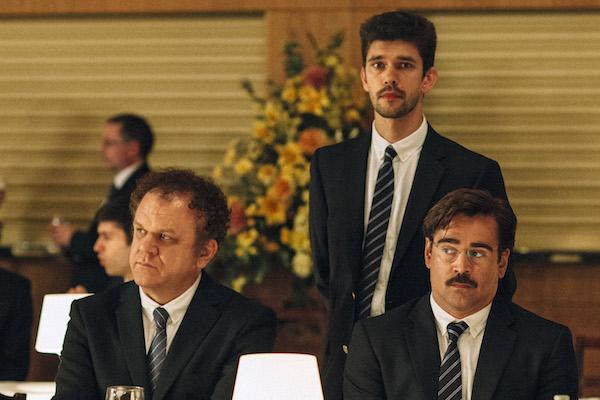
“The Lobster,” directed by Yorgos Lanthimos.
Photo courtesy of A24 and the San Francisco International Film Festival.
Sophia Stein: This is your third collaboration with your writing partner, Efthymis Filippou. Choosing a writing partner, I would imagine, is as particular as choosing a marriage partner.
Yorgos Lanthimos: [He laughs.] Yeah, it’s true.
Sophia Stein: How did you meet? How did you come together as writers?
Yorgos: He used to be a copywriter in an advertising agency, and I used to direct commercials in Greece. We became friends, and at some point, I went to him with the idea of Dogtooth. I asked him if he wanted to write a screenplay. He said that he had never written a screenplay, and he didn’t know exactly how one was written. I told him, “It doesn’t really matter, so long as the content is great, we’ll figure out the form.” That’s how we wrote Dogtooth.
As soon as we finished Dogtooth, we said, “O.K., what are we going to do next,” and we’ve just kept on doing that. Every time we finish a film, we start writing something new. We have discussions about what we’re interested in, and then we just start writing.
Sophia: Ariane, this is your second feature film with Yorgos. You have also collaborated in the theatre together. How did you first meet? What was unique to your experience of working together on The Lobster?
Ariane Labed: We met on my first film, Attenberg from director Athina Rachel Tsangari of Hungary. Yorgos was also an actor in the film. Then, he proposed me for the part in the film he was directing, Alps, and then The Lobster, and —
Yorgos: Platonov —
Ariane: Platonov [which Yorgos directed at the National Theatre of Greece]. Yeah, we work together quite a lot! The Lobster was different in that there were more people involved, it was a bigger production. It was Yorgos’ first English language movie. Anyway, you keep the same energy, the same way of working with actors, so it felt very natural.
Sophia: One of the things that I love about this film, The Lobster, is that it is delightfully unpredictable. For example, when the Loner Leader takes Short Sighted Woman to an eye surgeon, we immediately think that she is going to sabotage the relationship by repairing her vision, but the narrative jumps to a whole other level. [No spoilers!] I was curious, do you make a conscious effort to avoid obvious choices when you are writing?
Yorgos: Wouldn’t anyone? Whenever there is something that feels like it has been done and is just too familiar, we’re just not interested in doing that again. — But we don’t try to be different for the sake of being different. I guess there is a balance there. You have to feel confident that you have a voice. Although some stories might be similar to other stories, or the characters might be similar to other characters, you need to feel confident that there is a reason why you are telling this story, that it is going to be quite unique and particular because it’s us doing it and not someone else.
Sophia: The story is from the point of view of Colin Farrell’s character, David, but the voiceover narration is a woman. It is not until about one-third ways into the film that we discover that woman’s identity. How did you arrive at that choice?
Yorgos: Since we have Colin’s point of view, we didn’t want the voiceover to be Colin’s, as well. We wanted to create a certain kind of distance between the voiceover and what Colin was going through. We always intended it to be someone else’s voice, not the main character’s voice. For a time, we considered whether it should be Short Sighted Woman’s voice or The Maid’s voice — because The Maid is reading the diary to Loner Leader. We settled on Short Sighted Woman’s character because if it were The Maid, I thought it might be too confusing.
Sophia: It’s a great hook. There is a sense of suspense of wanting to discover, “Who is this?”
Ariane: If it were The Maid, you would have recognized my voice from the beginning — because of my accent. [She has a lovely and pronounced French accent.] That’s true.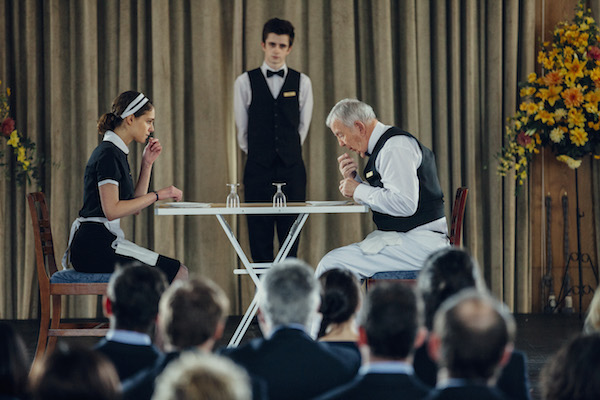
Photo courtesy of A24 and the San Francisco International Film Festival.
Sophia: The Maid is a fascinating character because she is one of the few characters in the film that has simultaneous access to both of these worlds – the world of coupling in the hotel and the world of the Loners in The Forest. What was your approach in developing this character?
Ariane: With Yorgos, we don’t really speak a lot about the psychology of the character. We don’t try to build a background story other than what you have in your hands, really. At the beginning, I wanted her to feel absolutely in that world of the hotel, very precise, well-behaved, just doing her job. I thought that it was interesting for her to realize that she has another purpose. I wanted her to be very attached to the Loner Leader [played by the commanding and charismatic Lea Sédoux], ready for anything in service to the Loner Leader. So The Maid had this internal little story — which doesn’t really belong to the world of the hotel or to the world of the Loners. She doesn’t actually fit to any world. All that she does, I think, is because she’s in love with Loner Leader. She’s moving through these two worlds with one purpose only.
Sophia: The film has that very singular opening: a woman jumps out of her car, runs to the middle of a field, and shoots a donkey. Was that opening scripted or something you discovered in the editing?
Yorgos: It was in the screenplay from very early on, I think. It just set up the whole tone and idea of what the film is about. It didn’t explain it, but it set a certain tone.
Sophia: Most definitely. It’s hysterical and frightening. After that opening, I was primed for anything. The Lobster truly is a global film production. It’s is an Irish-UK-Greek-French-Dutch Co-Production. You did physical production in Ireland, editing in the UK, post-production in Holland, and visual effects in France.
Yorgos: Editing in Greece, as well, on an island. In Tinso — an island in Cyclades. That was a good part.
Sophia: How did each place feed the creative process? How did you cast locations for each stage of production?
Yorgos: The most important part is to find the location where we were going to shoot. Ireland — that hotel and the area around it proved to be perfect for the film we had imagined! We found a hotel that was right by the sea, but surrounded by a beautiful forest. It was an old hotel with a history to it that also had some modern parts added to it — the swimming pool, for example. So it felt exactly right. A lot of the other co-production decisions are practical. When you are making a European co-production, you have to actually spend money in all the countries form which you’re taking the money! So sometimes it becomes a little bit more of a nuisance having to travel around and do every separate thing in a different place. At the same time, you meet talented people, people with whom you want to work again, so that’s a good thing aspect of it all.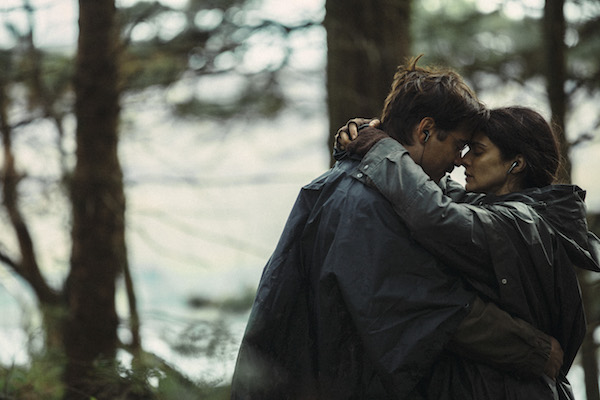
Photo courtesy of A24 and the San Francisco International Film Festival.
Sophia: Your story concept provided you with liberty to cast any actor of any nationality that you wanted. How did you decide that Colin Farrell was the perfect man for the part — which he is, by the way?
Yorgos: It’s a weird process, the casting process. It takes me quite a bit of time. I think of people with whom I want to work. I ask myself, “Which of these people would fit the character in one way or another?” Usually, all the actors that I am considering for a certain role are very different from one another. I just very instinctively try to decide who would be the best to do it. During that time, I watch a lot of their work. I also watch interviews and look at pictures of them – to try to get a better sense of them in many different ways, not just their acting work in other films, but to try to get a sense of the person. With Colin — I think I was drawn to his complexity. He’s very charming. He’s funny. He’s smart. He’s awkward, sometimes – I saw interviews in which he was very awkward, but very charming at the same time. He’s done some great work. I thought that he had all of these different qualities that would make for a more complex character.
Sophia: We have never seen Colin Farrell like this before – in his “tragically loner bod,” as he has called it. Did you discuss that transformation with him in advance or did he just arrive on-set looking like that?
Yorgos: That would be a huge surprise! We did discuss it from the first time we spoke. We met on Skype and I told him that I thought David should be “softer” than what Colin actually looks like. Colin wanted to distance himself, as well, from his image. Initially, Colin suggested that maybe that David should be very thin – because it was much easier for him to lose weight than actually gain weight. I thought that it wouldn’t be right for the character, that he would become slightly more pathetic, in a way. I thought that making him softer made more sense, whatever you imagined for his previous life. “Yeah, I understand that,” he said, and he went ahead and put on some added weight.
Sophia: The Lobster is your fourth feature film, but your first in English. Five years ago, you uprooted and relocated to England with the goal of making English language films. How has being a filmmaker in England fulfilled your expectations? In what ways, if any, has it challenged or disappointed those expectations?
Yorgos: Well, it’s far more complex than I had imaged because, as we discussed before, when you’re making a European co-production, you travel around a lot. In that sense, I have learned about making films in a different way, making them in a more structured environment. Our previous films in Greece were made with an extremely low budget; they were made with friends. Those films were made with a more flexible and free form approach. So the difference is that I was entering a more structured filmic environment with many rules of its own, and that made it a little bit more difficult for me. At the same time, I had more means than in making my previous films.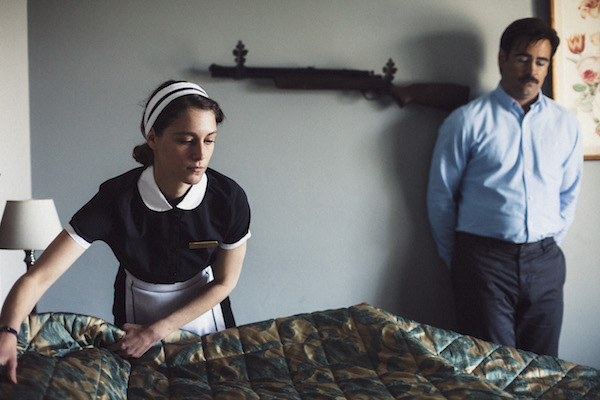
Photo courtesy of A24 and the San Francisco International Film Festival.
Sophia: Ariane, you also have adopted a London as your professional base?
Ariane: My parents are French. I’m French. But they love Greece, so I was born in Greece. I was raised in there until I was six. I studied theatre [in France], and afterwards, I started my acting career in Greece, actually. I moved to Greece for nine months, but in the end I stayed for three years. That’s where I acted in my two first films – Attenberg, then Alps, with Yorgos. And then, we moved together to London.
Yorgos: And then in France, they realized that you were French. So then you started making French films.
Ariane: Yeah, but they think I’m Greek — which is great. For me, it was better to be based in London than Athens, because it’s closer to Paris somehow. Like Yorgos said, it doesn’t really matter where you live, because we travel a lot. But for sure, we are based in Europe.
Yorgos: For now.
Sophia: Yorgos, what are you and Efthymis talking about in your writing room now?
Yorgos: Efthymis and I are completing a screenplay which is a bit of a psychological thriller with supernatural elements. I’ve also been developing another project; it’s a period film that takes place during Queen Anne’s reign in England. So I might do one of those two in the near future …
Sophia: There is that very poignant scene in The Lobster where Loner Leader asks David to dig his own grave and lie down in it — and even to cover himself with dirt. I really think that gets to the primordial fear that if you don’t have a spouse, and you don’t have children, and you’re alone in the world, you are going to have nobody to bury you. I’ve got to tell you that I was very, very moved by that scene. Thank you for such a – rich– experience. The Lobster offers a cinematic experience that is rare and magical and profound.
Top Image: Colin Farrell (David), “The Lobster,” directed by Yorgos Lanthimos. Photo courtesy of A24 and the San Francisco International Film Festival.
The Lobster – Official Website: Where you can determine your second chance animal if you fail to fall in love (or stay in love) with another person — you’ll be given a second chance as an animal. You will need to choose your second chance animal carefully. The following test will help determine what options are best for you (based on your personality, psychology, and defining characteristic).
“The Lobster,” directed by Yorgos Lanthimos.
Photo courtesy of A24 and the San Francisco International Film Festival.
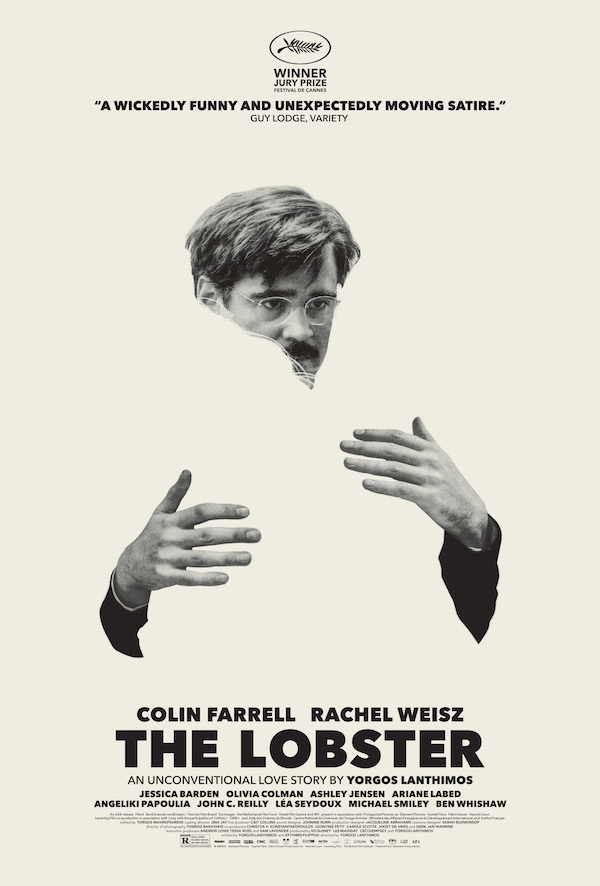
Sophia Stein writes about film and is a regular contributor to Cultural Weekly. Stein studied production at USC School of Cinema-TV. She worked as a Hollywood development executive, editing assistant and post-production supervisor. Currently, she resides in the San Francisco Bay area. She appreciates most those films that make her think, as well as laugh or cry.
